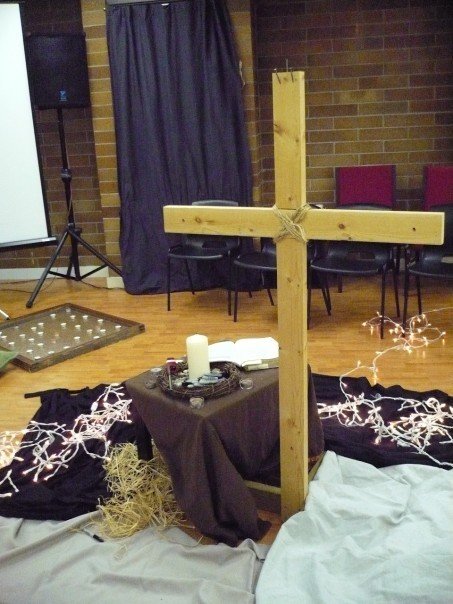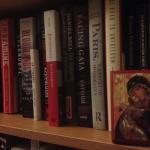
One of the lines that struck me very deeply when I first heard it in the old translation of the Novus Ordo anaphora was, Before he was given up to death, a death he freely accepted, he took bread and gave you thanks. I’m sure it was used when I was in Catholic high school, but the first time I really listened to it was while I was on retreat at my priest friend’s house of studies in Berkeley immediately after finishing my internship at a Chinese Anglican church in Richmond. The English words have now changed, of course — that was the 1975 translation of Eucharistic Prayer II, which has become in the 2010, At the time he was betrayed and entered willingly into his Passion. I’d almost venture to say that I like the first half of the new translation along with the second half of the old: a betrayal, but a death he freely accepted. It captures the lesson that I learned in my brief time in discerning a calling to the pastorate, specifically the Anglican priesthood, that I took away about what ministry ends up becoming. Friends of mine tell me that, having become Greek Catholic instead of Roman, I am now once again a viable candidate for ordination, as a married man. My retort is that it would first have to be a death that I freely accept.
My short-lived experimental foray into ministry had come to a formal end around that time. It was why I was on retreat at my priest’s friend’s house; I needed to get away from Richmond, away from Chinese evangelicalism, away from the noise of those spaces. It is a bit perversely funny that a year before, I had preached on the word betrayal in the Gospel according to John when some of the members of the youth group that I had founded, citing ‘betrayal’ from their leaders on very flimsy ground, had brought about its implosion, a turn of events that I was too inexperienced at the time to handle. The failure hardened me, casting my entire experience in the church, particular the Chinese evangelical one, as a series of betrayals that I had experienced since I was a young pastor’s kid. My mother objected, of course, begging me to recall the happy memories. The truth, of course, is that I probably needed therapy; the problem, as it were, was that my own father was a pastoral psychotherapist. Trapped in this overdetermined narrative, I concluded that what I needed to do was to get out, and in a probably sacrilegious scene now that I look back on it, I lit the candles at the altar in our sanctuary and told God that I quit. Remove me, if it’s helpful, I said. I fled into the system of academia, a world that I thought would not be beholden to such petty betrayals because it would not be presumably such a bubble. I’ve been in it long enough now, five years on its job market before I landed a permanent post, to know that I have grown into a much wiser man now.
The kondak and tropars for Great and Holy Thursday warn against becoming the betrayer, Judas, a lover of money. There is nothing redemptive about the sufferings of the betrayed, which means that there is no illusion that can recast traitorous acts that destroy friendships, relationships, careers, and ministries as something good in the end. My parents tried to remind me while I was going through my funk that Joseph eventually forgave his brothers, telling them that what they meant for evil, God meant for good when he was ruler of Egypt. But as a friend and I reflected yesterday on our arduous career journey within the academic sector — which is as hard hit, I am told, as any other professional sector in our zombie neoliberal economy — that we were not sure that it made us any better as people. If anything, it has made us lose a little bit of faith in humanity, especially people we counted as friends who then betrayed us when it worked to their advantage in climbing the ladder of prestige. It is against such betrayals — the love of money — that the mediations of Great and Holy Thursday warn, because the hell that they describe is the irreparable damage that selling out the ones you love will plunge you into, the pouch of money eloquently described in the tropars as the hangman’s noose. The warning is absolute: betrayal is absolutely evil, the nadir of the abyss.
This mystagogical lesson of the absolute devastation of the betraying act is imparted to us on Great and Holy Thursday, the eve of the Passion of the Lord, to warn us from the cheap ideology of the second chance. There is a fantasy that sometimes persists as a kind of perverse application of theodicy that what I meant for evil, God can still turn into good. No. The betrayal may effect a series of events that leads the betrayed to new life, but woe to the one by which the handing over is effected. The injunction against betraying a friend is thus unequivocal, closing off the speculation that the sins that I myself commit somehow do not matter in terms of my social conduct and ironically opening the possibility of reflecting on how I got where I was, though I was broken by the betrayals that got me here. It was why that line from the mass struck me as I capped off my time in ministry — that despite the betrayal, it was a death the Lord freely accepted. Reclaiming the events of my own personal history yet again as I must do every Great and Holy Week, I do not have to gloss over or sugarcoat the pain that has befallen me in church, academia, or otherwise in the worlds that I inhabit. There is no need to explain them away, or to explain them at all. It is what happened, no more, no less, and as I accept them, I become more conscious of where I am as I stand before the Lord, who in these days is crucified for us. May we share together in his resurrection.












